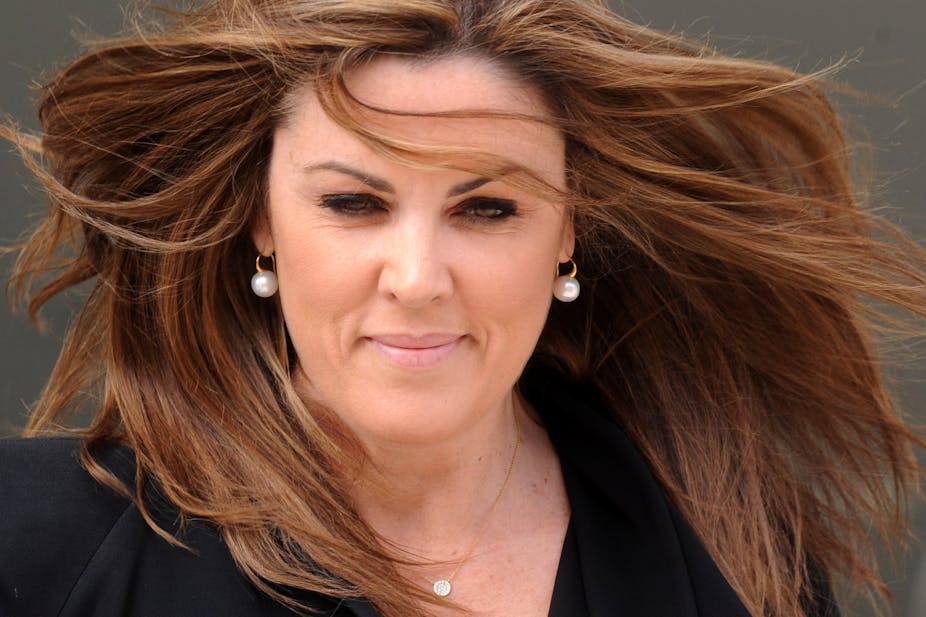Julie Bishop and Peta Credlin had one significant parallel experience on the way to government. They both survived three Liberal leaders.
Bishop was deputy to Brendan Nelson, Malcolm Turnbull and Tony Abbott. Credlin was chief of staff or deputy (Turnbull demoted her) in the offices of all three.
The women each have well-honed political skills and in government, positions of great power: Bishop as Foreign Minister as well as Liberal deputy (but not deputy prime minister), and Credlin as head of Abbott’s office, exercising remarkable sway over him and therefore the government.
They are also, according to one source who knows them well, “very similar personalities – very strong-willed, territorial, with a great sense of responsibility for whatever they are responsible for”.
Now the two are in a test of strength. It’s not as electric as has been portrayed this week when they were described as “like two Siamese fighting fish stuck in the same tank” (the expert advice, incidentally, says you need large tanks for those fish). They denied that comparison and apparently no row has been heard, there has been no overt flashpoint.
But the battle is real, and important for Tony Abbott and for his government. “Julie is the only one saying in a forceful way what everyone is thinking,” says one source.
The objections to the Abbott office are about Credlin’s centralisation and control. Some ministers have been running this line for a long time, and backbenchers as well. Certain ministers believe other ministers suck up to Credlin (or vice versa). Various ministers are mobilised on to the frontline to defend her when, as frequently these days, she’s under attack. It’s a complicated picture.
Bishop is both strong and in a strong position. Government has been good to her. She came to office well prepared; in addition she is (as Barack Obama once said of Julia Gillard) a quick study.
This year has also given her a high profile. After the MH17 disaster she was impressive at the United Nations Security Council. Australia’s temporary seat on the council provided a forum for her more generally.
In this week’s Essential poll, when people were asked about the performance of several leading politicians over the last 12 months, Bishop was the only one who came out with a net positive rating – plus 28. Tony Abbott was minus 22. Joe Hockey was minus 24 and Bill Shorten minus five.
Bishop has been Australia’s chief negotiator at the United Nations Lima climate talks this week; next year she will be overseeing Australia’s run up to the December Paris climate conference.
Having found her feet early in the government, Bishop is not going to be pushed around by Prime Ministerial staff – that is, Credlin.
Bishop was annoyed when Abbott sent Trade Minister Andrew Robb with her to Lima, especially when Robb was cast as her “chaperone” (although at the conference itself the two are said to have worked together well).
Bishop revealed publicly that she had initially been refused by the Prime Minister’s Office when she sought permission to go to Lima and that she pushed back and obtained approval (from cabinet); she also publicly made it clear she would be the team leader at Lima.
It was particularly important that she did not cede influence to Credlin on the climate issue. This was potentially tricky for Australia to manage at Lima; it is not going to get any easier in the countdown to the Paris conference and a new international agreement.
How well or badly Australian policy is managed will reflect on Bishop as much as on Abbott. She has to maintain a direct line to the Prime Minister on this crucial issue. She achieved that this week in relation to Australia’s contribution to the Green Climate Fund.
Abbott was dismissive of the fund but Bishop at the time of the G20 - which was a fiasco for the government on the climate front – indicated no decision had been taken to rule out a contribution.
Bishop spoke to Abbott from Lima and advised that Australia should put in some money. Abbott agreed and they announced $200 million. It was a sensible exercise in barnacle-cleaning.
It is worth remembering where Bishop has come from on climate change. Back in 2008, when Brendan Nelson was leader and climate policy an issue between him and an alliance of Malcolm Turnbull (shadow treasurer) and Greg Hunt (environment spokesman), Bishop was in the Turnbull/Hunt camp – those who said Australia must act, rather than waiting for the world.
Abbott – perennially under fire for not having more females in cabinet – now finds himself the man in the middle of two formidable women. He has to be loyal to Bishop; he wants to be loyal to Credlin – he describes his chief of staff as “the fiercest political warrior I’ve ever worked with”.
Credlin was the one closest to him in the trenches of opposition. But her degree of power, her management style, her omnipresence and her high visibility are eroding his authority. Bishop has called attention to the problem and, somehow, Abbott needs to fix it before it further damages him. He should ask Credlin, who has an opinion on most things, for some advice.

